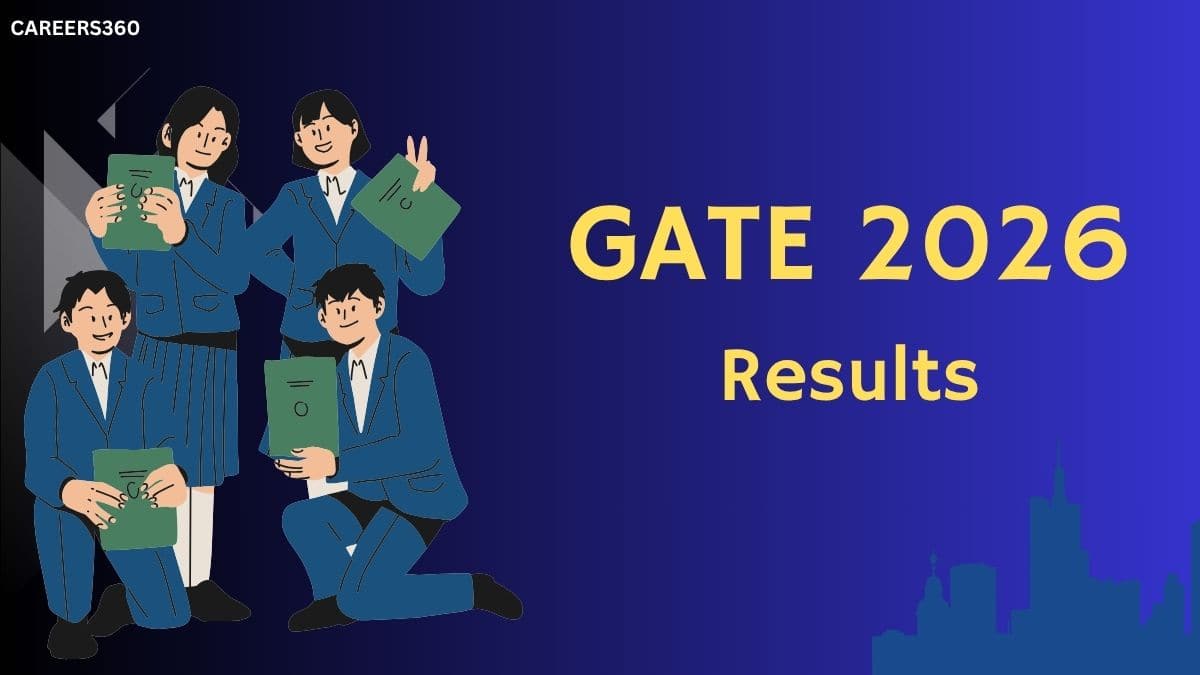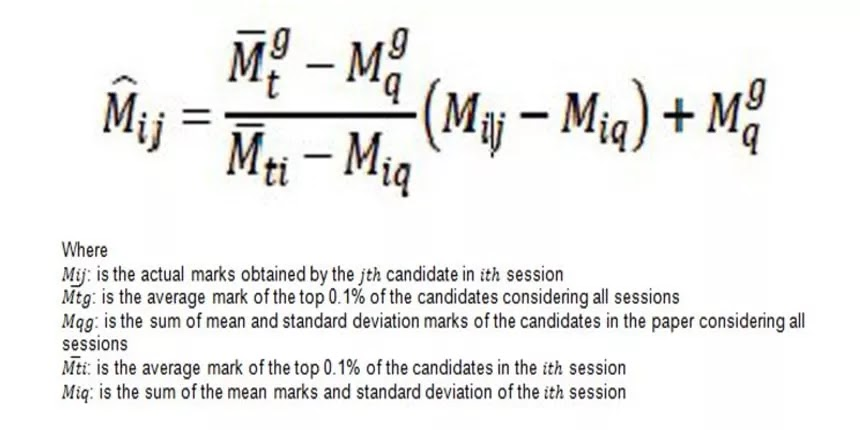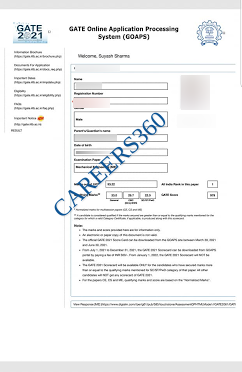UPES M.Tech Admissions 2026
Ranked #45 Among Universities in India by NIRF | 1950+ Students Placed 91% Placement, 800+ Recruiters
GATE result 2026 - IIT Guwahati will announce the GATE 2026 result on March 19, 2026. The GATE 2026 exam result link will be updated on the official website, gate2026.iitg.ac.in. Candidates need to enter their enrollment ID/email ID and password to check their GATE results 2026. The GATE scores out of 1000, marks out of 100, AIl India Rank (AIR) and category-wise qualifying marks in the result. Until then, candidates can use their GATE 2026 answer key to predict their marks. The GATE scorecard will be available for download from March 27, 2026, onwards. The authority conducted the GATE 2026 exam on February 7, 8, 14 and 15, 2026. Read the article to know all the details regarding the result of GATE.
Also check: GATE Rank Predictor | GATE Score Predictor
This Story also Contains

Below are some of the important facts and details about the GATE results that each candidate must be aware of while checking the GATE 2026 results online.
Particulars | GATE Result Details |
|---|---|
GATE 2026 Result Date | March 19, 2026 |
Portal | GOAPS portal |
| GATE 2026 official website | gate2026.iitg.ac.in |
Login Details to Check GATE Results | Email ID or enrolment number and password |
Score Card Release Date | March 27, 2026 |
Details mentioned in the GATE result 2026 | Registration number, gender, name of the examination paper, GATE score out of 1000, GATE marks out of 100, All India rank, and qualifying marks for each paper. |
Validity of GATE Exam Results | GATE 2026 score will be valid for 3 years from the date of announcement of the results. |
Use of GATE scores |
|
Total GATE applicants in previous years | GATE 2025 applications: 7.47 lakhs |
IIT Guwahati has declared the GATE 2026 result date on the official website, gate2026.iitg.ac.in. According to the latest update, the GATE 2026 exam result will be declared by March 19, 2026. Candidates can check the GATE exam 2026 result date in the table below.
Event | Dates |
|---|---|
GATE 2026 Exam Date | February 7, 8, 14 and 15, 2026 |
| Rectification of defects in the application form before GATE results | March 2026 |
| GATE 2026 final answer key (Expected) | March 2026 |
GATE 2026 results release date and time | March 19, 2026 (around 1.30 PM) |
GATE scorecard release date | March 27, 2026 |
Availability of scorecards for download by paying a fee of Rs. 500 per test paper | June 1 to December 31, 2026 |
The authority declared the GATE result at around 1:50 PM in 2025. We are expecting the same trends in 2026 year also. Hence, GATE result time should be around 1.30 PM.
IIT Guwahati will declare the result of GATE 2026 on March 19, 2026. Candidates will be able to check the IITG GATE 2026 result through the GOAPS portal using their login credentials. Below are the steps to check the GATE exam result 2026.

Note: Candidates are advised to check the details mentioned in the GATE result pdf carefully and in case of any discrepancy contact the zonal IIT for correction.
Related links:
The following details are mentioned in the GATE 2026 result IIT Guwahati.
IIT Guwahati will release the GATE topper list with marks on the official website. The topper list with marks for GATE 2026 will be available after the declaration of the GATE results. Candidates can check the GATE AIR 1 to know the names of toppers, marks obtained and scores. Until then, candidates can check the previous year's GATE Toppers list along with their marks below.
| GATE Paper | Name of the Candidate | Raw Marks (out of 100) | GATE Score (out of 1000) |
|---|---|---|---|
| Aerospace Engineering | BALAMURUGAN | 81 | 990 |
| Agricultural Engineering | KEERTHI REVANTH KUMAR | 74.67 | 1000 |
| Architecture and Planning | JAYANTH GIFTSON R | 83 | 1000 |
| Biomedical Engineering | TANISH GUPTA | 77.67 | 1000 |
| Biotechnology | ARNAB PAUL | 66.67 | 1000 |
| Civil Engineering | ABHAY SINGH | 89.02 | 1000 |
| Chemical Engineering | AMLAN KUMAR TRIPATHY | 75.33 | 1000 |
| Computer Science and Information Technology | RAHUL KUMAR SINGH | 100 | 1000 |
| Chemistry | DEBASIS MANDAL | 70 | 1000 |
| Data Science and Artificial Intelligence | SADINENI NIKHIL CHOWDARY | 96.33 | 1000 |
| Electronics and Communication Engineering | SWARNAVA BISWAS | 82.67 | 1000 |
| Electrical Engineering | PRADIP CHAUHAN | 81.67 | 1000 |
| Environmental Science and Engineering | YASH JAIN | 67.33 | 1000 |
| Ecology and Evolution | KESHAV R MENON | 86.33 | 1000 |
| Geomatics Engineering | NITISH KUMAR | 61.67 | 1000 |
| Geology and Geophysics (Geology) | SUMIT GHOSH | 76.67 | 970 |
| Geology and Geophysics (Geophysics) | RAHUL MUKHERJEE | 70.67 | 1000 |
| Instrumentation Engineering | KAILASH GOYAL | 65 | 993 |
| Mathematics | SOHAM PAL | 57 | 1000 |
| Mechanical Engineering | RAJNEESH BIJARNIYA | 95.33 | 967 |
| Mining Engineering | ANIKET KUMAR GUPTA | 75.67 | 1000 |
| Metallurgical Engineering | YOGESH SARMA SEDAI | 89.67 | 941 |
| Naval Architecture and Marine Engineering | JATIN PAL | 52.33 | 1000 |
| Petroleum Engineering | SAURABH KUMAR | 74 | 1000 |
| Physics | PURNENDU DAS | 76.67 | 1000 |
| Production and Industrial Engineering | DEVENDRA DHANANJAY UMBRAJKAR | 85.67 | 1000 |
| Statistics | ARCHISHMAN MUKHERJEE | 77 | 1000 |
| Textile Engineering and Fibre Science | YADAV AVADHESH ANANTRAM | 73.67 | 1000 |
| Engineering Sciences (Engineering Mathematics, Fluid Mechanics, Solid Mechanics) | ANANT PRAKASH PANDEY | 88.33 | 1000 |
| Humanities and Social Sciences (Sociology) | VICTOR PRINCE N J | 80 | 939 |
| Humanities and Social Sciences (Psychology) | SANJNA SHUKLA | 89 | 922 |
| Humanities and Social Sciences (Linguistics) | MOOMAL MAJEE | 81 | 1000 |
| Humanities and Social Sciences (Sociology) | ARIJIT SENGUPTA | 80 | 939 |
| Humanities and Social Sciences (English) | NAOREET KHONDEKAR | 71 | 1000 |
| Humanities and Social Sciences (Economics) | SAMBUDDHA ROYCHOWDHURY | 87.33 | 948 |
| Humanities and Social Sciences (Philosophy) | MOHIT KUMAR | 76 | 1000 |
| Life Sciences (Chemistry, Biochemistry, Zoology) | YUGANSH BHATIA | 78.67 | 1000 |
| Test Paper | GATE Topper Names | Raw Marks (out of 100) | GATE Score (out of 1000) |
|---|---|---|---|
| Aerospace Engineering | KUNDAN JAISWAL | 86.33 | 962 |
| Agricultural Engineering | PRATIK SHERKE | 75.67 | 1000 |
| Architecture and Planning | GAJENDER KUMAR SHARMA | 77 | 981 |
| Biomedical Engineering | SANJEEV C ACHAR | 54.33 | 1000 |
| Biotechnology | AKANKSHA S | 83 | 1000 |
| Civil Engineering | DEEPAK | 87.33 | 989 |
| Civil Engineering | BHANU PRATAP SINGH | 87.33 | 989 |
| Chemical Engineering | ADARSH RAI | 73.33 | 1000 |
| Computer Science and Information Technology | PIYUSH KUMAR | 90 | 1000 |
| Chemistry | HIMANSHU PAPNAI | 78 | 1000 |
| Data Science and Artificial Intelligence | AYYAGARI SATHYA SAI SRIKAR | 90 | 1000 |
| Electronics and Communication Engineering | RAJA MAJHI | 84.67 | 1000 |
| Electrical Engineering | MANOJ KUMAR SINHA | 77 | 1000 |
| Electrical Engineering | SHIVAM | 77 | 1000 |
| Electrical Engineering | SAI KIRAN ADELLY | 77 | 1000 |
| Environmental Science and Engineering | GADDIPATI YASWANTH BABU | 77.33 | 965 |
| Ecology and Evolution | DHRUBOJYOTI PATRA | 81.67 | 1000 |
| Geomatics Engineering | VAIBHAV SONKAR | 79.33 | 1000 |
| Geology and Geophysics (Geology) | JAYDEEP ROY | 82.33 | 1000 |
| Geology and Geophysics (Geophysics) | SHIVAM KUMAR RAI | 75.33 | 999 |
| Instrumentation Engineering | RISHABH GUPTA | 82.67 | 984 |
| Mathematics | SUYASH SRIVASTAVA | 71.33 | 1000 |
| Mechanical Engineering | SURAJ KUMAR SAMAL | 84.67 | 1000 |
| Mining Engineering | ANURAG KUMAR PATHAK | 58.33 | 966 |
| Metallurgical Engineering | HRUTIDIPAN PRADHAN | 81.67 | 977 |
| Naval Architecture and Marine Engineering | PRINCE KUMAR | 55.33 | 1000 |
| Petroleum Engineering | SAURABH KUMAR | 80.67 | 955 |
| Physics | ANURAG SINGH | 78.33 | 1000 |
| Production and Industrial Engineering | KUMAR VISHESH | 84.67 | 1000 |
| Statistics | SINCHAN SNIGDHA ADHIKARY | 89.67 | 1000 |
| Textile Engineering and Fibre Science | MEENU MUNJAL | 72 | 1000 |
| Engineering Sciences (Engineering Mathematics, Fluid Mechanics, Solid Mechanics) | GHANSHYAM GIRISH DHAMAT | 83 | 989 |
| Humanities and Social Sciences (Economics) | SRIJAN SHASHWAT | 70.33 | 940 |
| Humanities and Social Sciences (English) | AJAY KUMAR | 83 | 1000 |
| Humanities and Social Sciences (Linguistics) | JESU NAZARENE ROY | 77.33 | 1000 |
| Humanities and Social Sciences (Philosophy) | UTKARSH RANA | 58.67 | 1000 |
| Humanities and Social Sciences (Psychology) | SRISHTI DATTA | 77.67 | 975 |
| Humanities and Social Sciences (Sociology) | MOHAMMED SHEFIN M P | 63 | 1000 |
| Life Sciences (Chemistry, Biochemistry, Zoology) | SIDDHANT BHARDWAJ | 77.33 | 1000 |
After the evaluation of the answers, the actual (raw) marks obtained by a candidate will be considered for computing the GATE 2026 score. For multi-session papers (subjects), raw marks obtained by the candidates in different sessions will be converted to normalized marks for that particular subject. Thus, raw marks (for single-session papers) or normalized marks (for multi-session papers) will be used for computing the GATE score 2026, based on the qualifying marks.
As authorities conduct the GATE exam in multiple sessions, the same normalization process will be used to take into account any variation in the difficulty levels of the question papers across different sessions. Authorities will normalize the marks based on the fundamental assumption that "in all multi-session GATE 2026 papers, the distribution of abilities of candidates is the same across all the sessions".
This assumption is justified since the number of candidates appearing in multi-session papers in GATE 2026 is large and the procedure for the allocation of sessions to candidates is random. Based on this, and considering various normalization methods, authorities will follow the below-given formula to calculate the normalized marks for the multi-session GATE papers 2026: -

Read More: GATE Normalisation process: How Scores are calculated?


Candidates can check the GATE result 2026 to know the marks vs rank. The marks vs rank of GATE will help the candidates know their rank based on the marks obtained in the entrance test. Below are the GATE marks vs rank for CSE, Mechanical, Electronics, EE and other papers. The marks vs rank for GATE is mentioned based on the previous year information.
| Rank | Marks | ||||
|---|---|---|---|---|---|
Mechanical | CSE | Civil | Electronics | Electrical | |
1-10 | 92+ | 80+ | 90+ | 73+ | 91+ |
10-50 | 87-92 | 75-80 | 85-90 | 67-73 | 87-91 |
50-100 | 85-87 | 72-75 | 78-85 | 63-67 | 84-87 |
100-200 | 82-85 | 68-72 | 74-78 | 60-63 | 81-84 |
200-500 | 79-82 | 62-68 | 70-74 | 56-60 | 77-81 |
500-1000 | 75-79 | 56-62 | 64-70 | 50-56 | 72-77 |
1000-2000 | 71-75 | 50-56 | 57-64 | 45-50 | 66-72 |
2000-5000 | 63-71 | 40-50 | 50-57 | 38-45 | 57-66 |
5000-10000 | 51-63 | 32-40 | 40-50 | 28-38 | 46-57 |
Quick Links:- What is a Good GATE Score?
The authority will release the GATE qualifying cutoff along with the declaration of the GATE exam result 2026. Candidates whose marks in the GATE exam are more than the qualifying marks will be considered as passed. The qualifying candidates have to participate in the COAP and CCMT counselling process for admission to IITs, NITs, IIITs and GFTIs. Moreover, the GATE qualifying cutoff and admission cutoff are different. Below is the GATE qualifying cutoff as per the previous year analysis.
| Test Paper | CUT-Off (GEN) | CUT-Off (OBC-NCL/EWS) | CUT-Off (Sc/STPWD) |
|---|---|---|---|
Aerospace Engineering | 28.9 | 26 | 19.2 |
Agricultural Engineering | 25 | 22.5 | 16.6 |
Architecture and Planning | 40 | 36 | 26.6 |
Biomedical Engineering | 29.2 | 26.2 | 19.4 |
Biotechnology | 28 | 25.2 | 18.6 |
Civil Engineering | 29.2 | 26.2 | 19.4 |
Chemical Engineering | 27.7 | 24.9 | 18.4 |
Computer Science and Information Technology | 29.2 | 26.2 | 19.4 |
Chemistry | 25 | 22.5 | 16.6 |
Data Science and Artificial Intelligence | 29 | 26.1 | 19.3 |
Electronics and Communication Engineering | 25 | 22.5 | 16.6 |
Electrical Engineering | 25 | 22.5 | 16.6 |
Environmental Science and Engineering | 26.1 | 23.4 | 17.4 |
Ecology and Evolution | 39.5 | 35.5 | 26.3 |
Geomatics Engineering | 25.7 | 23.1 | 17.1 |
Geology and Geophysics (Geology) | 38.4 | 34.5 | 25.5 |
Geology and Geophysics (Geophysics) | 40 | 36 | 26.6 |
Instrumentation Engineering | 25.6 | 23 | 17 |
Mathematics | 25 | 22.5 | 16.6 |
Mechanical Engineering | 35.8 | 32.2 | 23.8 |
Mining Engineering | 30.6 | 27.5 | 20.4 |
Metallurgical Engineering | 40 | 36 | 26.6 |
Naval Architecture and Marine Engineering | 25.1 | 22.5 | 16.7 |
Petroleum Engineering | 31.1 | 27.9 | 20.7 |
Physics | 26.8 | 24.1 | 17.8 |
Production and Industrial Engineering | 35.6 | 32 | 23.7 |
Statistics | 30.2 | 27.1 | 20.1 |
Textile Engineering and Fibre Science | 34.7 | 31.2 | 23.1 |
Engineering Sciences | 35.4 | 31.8 | 23.5 |
Humanities and Social Sciences (Economics) | 40 | 36 | 26.6 |
Humanities and Social Sciences (English) | 40 | 36 | 26.6 |
Humanities and Social Sciences (Linguistics) | 40 | 36 | 26.6 |
Humanities and Social Sciences (Philosophy) | 40 | 36 | 26.6 |
Humanities and Social Sciences (Psychology) | 40 | 36 | 26.6 |
Humanities and Social Sciences (Sociology) | 40 | 36 | 26.6 |
Life Sciences | 31.3 | 28.1 | 20.8 |
| GATE Paper Code | Qualifying GATE Cutoff Marks | ||
|---|---|---|---|
General | OBC-NCL/EWS | SC/ST/PWD | |
| Aerospace Engineering | 33.3 | 29.9 | 22.1 |
| Agricultural Engineering | 25 | 22.5 | |
| Architecture and Planning | 41.5 | 37.3 | 27.6 |
| Biomedical Engineering | 25 | 22.5 | 16.6 |
| Biotechnology | 38.9 | 35 | 25.9 |
| Civil Engineering | 28.3 | 25.4 | 18.8 |
| Chemical Engineering | 25 | 22.5 | 16.6 |
| Computer Science and Information Technology | 27.6 | 24.8 | 18.4 |
| Chemistry | 25.2 | 22.6 | 16.7 |
| Data Science and Artificial Intelligence | 37.1 | 33.3 | 24.7 |
| Electronics and Communication Engineering | 25 | 22.5 | |
| Electrical Engineering | 25.7 | 23.1 | 17.1 |
| Environmental Science and Engineering | 37.9 | 34.1 | 25.2 |
| Ecology and Evolution | 35.8 | 32.2 | 23.8 |
| Geomatics Engineering | 41.1 | 36.9 | 27.4 |
| Geology and Geophysics (Geology) | 42 | 37.8 | 28 |
| Geology and Geophysics (Geophysics) | 49 | 44.1 | 32.6 |
| Instrumentation Engineering | 32.7 | 29.4 | 21.8 |
| Mathematics | 25 | 22.5 | 16.6 |
| Mechanical Engineering | 28.6 | 25.7 | 19 |
| Mining Engineering | 25 | 22.5 | 16.6 |
| Metallurgical Engineering | 41 | 36.9 | 27.3 |
| Naval Architecture and Marine Engineering | 25.1 | 22.5 | 16.7 |
| Petroleum Engineering | 42.6 | 38.3 | 28.4 |
| Physics | 32 | 28.8 | 21.3 |
| Production and Industrial Engineering | 30.5 | 27.4 | 20.3 |
| Statistics | 26.6 | 23.9 | 17.7 |
| Textile Engineering and Fibre Science | 28.1 | 25.2 | 18.7 |
| Engineering Sciences | 36.2 | 32.5 | 24.1 |
| Humanities and Social Sciences (Economics) | 37 | 33.3 | 24.6 |
| Humanities and Social Sciences (English) | 48 | 43.2 | 32 |
| Humanities and Social Sciences (Linguistics) | 49.7 | 44.7 | 33.1 |
| Humanities and Social Sciences (Philosophy) | 39.3 | 35.3 | 26.1 |
| Humanities and Social Sciences (Psychology) | 52.7 | 47.4 | 35.1 |
| Humanities and Social Sciences (Sociology) | 36 | 32.4 | 24 |
| Life Sciences | 29.3 | 26.3 | 19.5 |
| GATE Paper Code | GATE 2023 Qualifying Cutoff Marks | ||
|---|---|---|---|
General | OBC-NCL/EWS | SC/ST/PWD | |
Statistics | 25 | 22.5 | 16.6 |
Physics | 31.1 | 27.9 | 20.7 |
CS | 32.5 | 29.2 | 21.6 |
ECE | 29.9 | 26.9 | 19.9 |
CE | 26.6 | 23.9 | 17.7 |
IN | 34.8 | 31.3 | 23.2 |
Electrical engineering | 25 | 22.5 | 16.6 |
Mechanical Engineering (ME) | 28.4 | 25.5 | 18.9 |
XE | 37.9 | 34.1 | 25.2 |
CH | 32.10 | ||
| GATE Paper 2022 | GATE Qualifying Marks | ||
|---|---|---|---|
General | OBC-NCL/ EWS | SC/ST/PwD | |
CS | 25 | 22.5 | 16.6 |
ECE | 25 | 22.5 | 16.5 |
Biotechnology | 35.5 | 31.9 | 23.6 |
Chemical Engineering | 25.3 | 22.7 | 16.8 |
Statistics | 25 | 22.5 | 16.6 |
Metallurgical engineering | 46.2 | 41.5 | 30.8 |
Mathematics | 27.3 | 24.5 | 18.2 |
Electrical engineering | 30.7 | 27.6 | 20.4 |
Textile engineering and fibre science | 36.8 | 34.9 | 25.6 |
Mechanical Engineering (ME) | 28.1 | 25.2 | 18.7 |
Physics | 26.5 | 23.8 | – |
Life Science (Botany/ Zoology) | 33.9 | 30.5 | 22.5 |
Ecology and life sciences | 33.4 | 30 | 22.2 |
Agriculture Engineering | 26.3 | 23.6 | 17.5 |
Chemistry | 27.5 | 24.7 | 18.3 |
Mining Engineering | 25.5 | 22.9 | 17 |
Engineering Sciences (Fluid Mechanics/ Thermodynamics) | 40.3 | 36.2 | 26.8 |
IIT Guwahati will release the GATE scorecard on March 27, 2026 on the official website. Candidates who qualify the entrance exam can download the scorecard of GATE 2026. To download the GATE scorecard, an enrolment id and password are required. The details such as marks obtained, All India rank, normalized score, and candidate details will be mentioned in the GATE scorecard 2026.
Candidates are advised to preserve the scorecard of GATE for future reference. How long is the GATE 2026 score valid for? Well, its validity for M.Tech admissions is three years from the date of declaration of the GATE results 2026. However, it is to be noted that this validity may not apply to PSU recruitment unless the recruitment advertisement specifies it. Follow the steps mentioned below to download the scorecard of GATE 2026.
Candidates can check the GATE result statistics online. The authority will release the exam statistics along with the GATE result 2026. Until the GATE result statistics are announced, candidates can check the previous year's GATE statistics, GATE qualifying candidates, and more:
Particular | Details |
|---|---|
Total number of students applied for GATE 2025 | 9.36 lakh |
Total number of students appeared for GATE 2025 | 7.47 lakh |
Particular | Details |
|---|---|
Total number of students applied for GATE 2024 | 8.26 lakh |
Total number of students appeared for GATE 2024 | 6.5 lakh |
Particular | Details |
|---|---|
Total number of students applied for GATE 2023 | 6.70 lakh |
Total number of students appeared for GATE 2023 | 5.17 lakh |
Candidates can opt for higher education or work with various reputed organisations. Some of the options that candidates can opt for after qualifying GATE 2026.
Frequently Asked Questions (FAQs)
Candidates will be able to check GATE exam result 2026 at gate2026.iitg.ac.in, using their email ID/enrollment number and password to check the result.
The GATE 2026 result is only for viewing purposes. The GATE scorecard is the document required and will be valid for three years from the date of announcement of the result.
The GATE 2026 scorecard will be available for download on March 27, 2026. Candidates can download the GATE 2026 scorecard through the GOAPS portal using their email ID/enrolment ID and password.
The GATE scorecard will be available online mode only.
The GATE score is calculated on the relative performance of a student in comparison with students who appear for the same paper keeping the difficulty levels of the sessions in mind. Since the no. of students who will appear for the certain GATE paper is not disclosed, it is not possible for students to calculate their scores. However, score predictor tools using past year's trends should help with gauge the scores.
The information like the candidate’s name, exam paper, and code, registration number, qualifying marks, scores secured out of 100, etc is specified on the GATE result 2026.
The qualifying marks for each GATE paper will differ and that also will differ for each category. All the details are available above in this article.
The GATE score is the normalized score out of 1000 calculated on the basis of the normalization formula. GATE marks are the actual marks obtained by candidates out of 100 in the exam.
The GATE 2026 result will be out on March 19, 2026.
The GATE exam results 2026 can be checked on the official website. Candidates wanting to know how to check the GATE result 2026 can go through the above article.
On Question asked by student community
The cutoff marks for OBC category students are different for different paper codes. You can check the article on Gate cutoff for all the detailed information. Hope it helps.
IIT Guwahati has released GATE exam ME answer key in online mode. Here we have provided direct link to download IIT Guwahati Mechanical Engineering answer key.- Download Here
The official GATE 2026 Shift 2 (Feb 8) answer key was released by IIT Guwahati on February 22, 2026, on the GOAPS portal.
Check out the GATE 2026 February 8 Question Paper with Solutions .
Hi Raj, please check the link for GATE Agricultural Engineering question paper 2026 to know about the syllabus and the topic covered.
Hi Uma,
You can download GATE 2026 February 8 question paper with solutions by clicking on the link below:
Among top 100 Universities Globally in the Times Higher Education (THE) Interdisciplinary Science Rankings 2026
NAAC A+ Accredited | Among top 2% Universities Globally (QS World University Rankings 2026)
Ranked #45 Among Universities in India by NIRF | 1950+ Students Placed 91% Placement, 800+ Recruiters
NAAC A+ Accredited | Scholarships worth 5 CR
1st in NPTEL program of 6 IITs | Highest CTC 72 LPA | Scholarships to meritorious students
Asia’s only university to be awarded the highest accreditation by WASC, USA and by the Quality Assurance Agency for Higher Education (QAA), UK